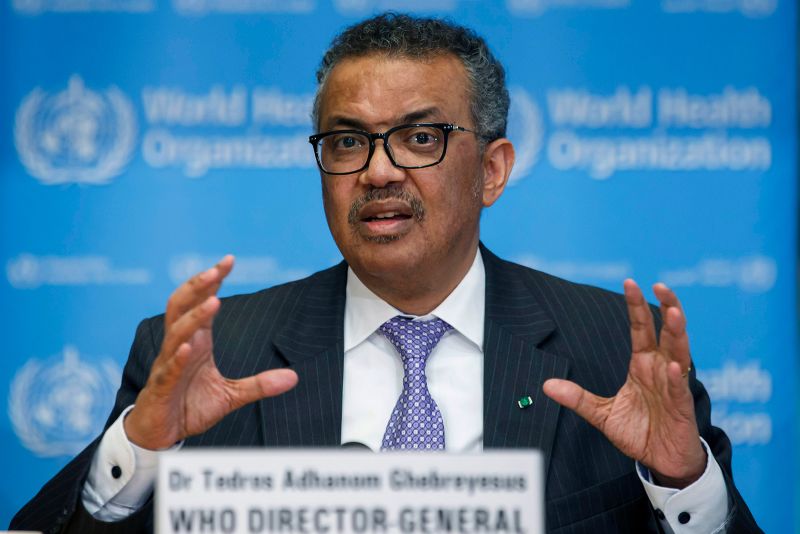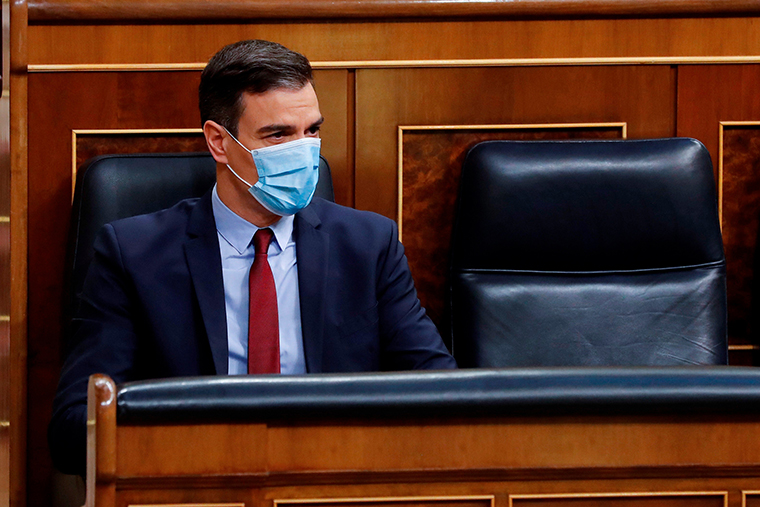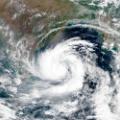begin quote from:
WHO reports largest single-day increase in Covid-19 cases
WORLD UPDATES
Almost two-thirds of the new coronavirus diagnoses were reported in just four countries
Coronavirus pandemic: Updates from around the world
What you need to know
WHO reports largest single-day increase in coronavirus cases

Tedros Adhanom Ghebreyesus, Director General of the World Health Organization, speaks during a news conference at the WHO headquarters in Geneva, Switzerland, on March 9. Salvatore Di Nolfi/Keystone/AP
“We still have a long way to go in this pandemic,” Tedros said at a briefing in Geneva. “In the last 24 hours, there have been 106,000 cases reported to WHO – the most in a single day since the outbreak began. Almost two-thirds of these cases were reported in just four countries.”
Those four countries, WHO infectious disease epidemiologist Maria Van Kerkhove confirmed to CNN in an email, are: the United States, Russia, Brazil and India.
It is important to note: There can be delays in reporting at many points in the process, so this single-day record does not mean that these 106,000 people were infected, tested or counted in the last 24 hours.
CNN exclusively relies on Johns Hopkins University for its case and death counts, but the world’s preeminent health agency making this announcement today is newsworthy.
1 hr 10 min ago

Tedros Adhanom-Ghebreyesus, director-general of the World Health Organization, on Wednesday said that more cases had been reported to the agency in the last 24 hours than any time since the novel coronavirus outbreak began.
“We still have a long way to go in this pandemic,” Tedros said at a briefing in Geneva. “In the last 24 hours, there have been 106,000 cases reported to WHO – the most in a single day since the outbreak began. Almost two-thirds of these cases were reported in just four countries.”
Those four countries, WHO infectious disease epidemiologist Maria Van Kerkhove confirmed to CNN in an email, are: the United States, Russia, Brazil and India.
It is important to note: There can be delays in reporting at many points in the process, so this single-day record does not mean that these 106,000 people were infected, tested or counted in the last 24 hours.
CNN exclusively relies on Johns Hopkins University for its case and death counts, but the world’s preeminent health agency making this announcement today is newsworthy.
EU releases new guidelines for flying that include face masks and hand hygiene

Thanassis Stavrakis/AP
“Passengers have to have confidence that taking to the skies again in a confined space with other people poses the minimum possible risk to their health,” European Commissioner for Transport Adina Valean said in the statement. “The protocol released today will reassure passengers that it is safe for them to fly and so help the industry recover from the effects of this pandemic.”
1 hr 39 min ago

The European Union’s health and aviation bodies have issued a new set of guidelines for air travel, recommending the use of face masks and the practice “scrupulous and frequent” hand hygiene on flights in order to ensure safety of travelers and aviation personnel amid the Covid-19 pandemic.
In a joint statement issued on Wednesday, the European Union Aviation Safety Agency (EASA) and European Centre for Disease Prevention and Control (ECDC) also recommend that social distancing be observed whenever possible.
“Passengers have to have confidence that taking to the skies again in a confined space with other people poses the minimum possible risk to their health,” European Commissioner for Transport Adina Valean said in the statement. “The protocol released today will reassure passengers that it is safe for them to fly and so help the industry recover from the effects of this pandemic.”
Spain's state of emergency extended for 5th time in tight parliamentary vote

Spanish Prime Minister, Pedro Sanchez wears a face mask during a parliamentary plenary session on May 20. Andres Ballesteros/Pool/AFP/Getty Images

In a tight vote, the Spanish Parliament on Wednesday narrowly approved the fifth extension of the country’s state of emergency for another two weeks.
The state of emergency will last until June 7.
Now in its tenth week, the extended state of emergency, which has been in place since March 14, will allow the Spanish government to continue regulating restrictions on movement with the aim of controlling the coronavirus for a total of 12 weeks.
Some context: The lengthy state of emergency has widened political rifts in Spain, with the right and far right accusing the government of ineptitude in handling the Covid-19 pandemic, blaming it for tens of thousands of deaths, and holding it responsible for the country’s economic nosedive.
Speaking ahead of the vote in Spain’s lower chamber, Prime Minister Pedro Sánchez said that in the fight against Covid-19, "the state of emergency and de-escalation have worked, the state of emergency will not last one day longer than it needs to."
Sánchez was firm in his position that “there is no alternative to the state of emergency” and lifting it now “would be an extraordinary irresponsibility."
Spain imposed some of Europe’s strictest confinement and de-escalation measures, gradually lifting restrictions asymmetrically across the country starting in early May, depending on infection rates and the capacity of health institutions in its territories.
The prime minister said the country is “in the last few meters [yards] of the state of emergency."
Spain is among countries with the world’s highest coronavirus infection and death numbers; but has managed to significantly bring those down in recent weeks.








No comments:
Post a Comment